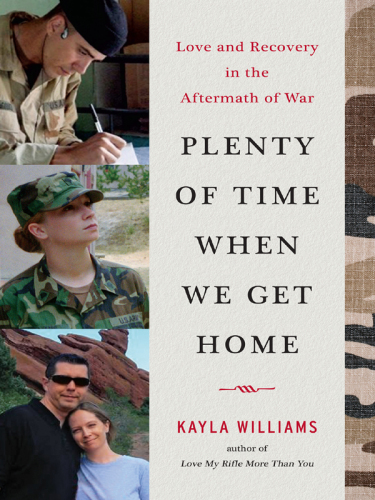
Plenty of Time When We Get Home
Love and Recovery in the Aftermath of War
کتاب های مرتبط
- اطلاعات
- نقد و بررسی
- دیدگاه کاربران
نقد و بررسی

November 11, 2013
Following a harrowing war experience, Williams (Love My Rifle More than Me) shows readers a view of veterans often absent from current American media: the healing of and love between two battle-traumatized U.S. Army veterans exhausted from facing inner demons and struggles with bureaucratic red tape. In October 2003, Sgt. Williams, an Arabic linguist with the 101st Airborne Division, was smitten with a fellow soldier, Brian McGough, who was severely wounded with a brain injury caused by shrapnel from a roadside bomb in Iraq. Stateside, the two marry, but post-traumatic stress derails McGoughâs re-integration into the civilian world. Williams not only details his erratic behaviorâthe heavy drinking and his abusive treatment of herâbut also her own struggles in a nation largely insensitive to its female warriors. Both of these vets survive a slew of challenges in their psychological battles, overcoming the defects of their start-and-stop union with grit, love, and a sympathetic support network of former troops. Rising above recent memoirs by celebrated female soldiers, Williamsâs account is ruthlessly raw and objective, aiding our greater understanding of the obstacles faced by veterans stateside. Includes an appendix of resources for military veterans.

Starred review from December 15, 2013
An Iraq War veteran chronicles the emotionally raw, disarmingly candid saga of herself and her fellow veteran husband returning to civilian life psychologically and physically wounded. Williams previously shared her brutal saga of being female in a combat zone (Love My Rifle More Than You, 2005), alluding to it occasionally in this follow-up memoir. While in combat, she briefly met and felt close to Brian McGough. But he moved to a new assignment, where he suffered a severe brain injury from an explosive device. Stationed back in the United States, Williams located McGough, and they began a romantic relationship marked by threatened and actual violence due to his post-traumatic stress disorder and her undiagnosed psychological disabilities. Their military commands and the Veterans Administration seemed ill-equipped to deal sensitively and competently with such disabilities. In excruciating detail, Williams shares scenes from a marriage almost certain to explode. Even when she was away from her husband, Williams struggled with certain aspects of everyday life. Shopping alone in a gigantic Wal-Mart, she was overwhelmed by the variety of products, resentful that the civilian population was so spoiled, and anxiety-ridden that she could not view any store exits from the endless aisles of merchandise. Though counseling by civilians and military personnel occasionally helped both the author and her husband, progress toward a normal life seemed illusory--at best, one step forward and two steps back. How Williams and McGough partially conquered the demons, saved their marriage, began to rear children and helped countless other damaged veterans makes for an inspiring but never maudlin narrative. The memoir is certainly not a feminist tract, but Williams does examine the special adjustment problems of female combat veterans. A brave book filled with gore and trauma--and superb storytelling. A perfect complement to David Finkel's Thank You for Your Service (2013).
COPYRIGHT(2013) Kirkus Reviews, ALL RIGHTS RESERVED.

Starred review from December 1, 2013
In October 2003, Brian McGough, a soldier's soldier, was hit in the head by an IED (improvised explosive device) in Iraq. Shrapnel entered McGough's helmet behind his ear, tearing through the scalp and skull. Sergeant Kayla Williams of the 101st Airborne Division, author of Love My Rifle More Than You: Young and Female in the U.S. Army (2005), met McGough while also serving in Iraq. After McGough returned stateside, they married. Awarded a Purple Heart, McGough was released from Walter Reed and sent back to duty even though he still had a hole in the back of his skull and was clearly suffering from post-traumatic stress disorder (PTSD). In this searing and brutally honest memoir, Williams chronicles all that McGough suffered at the hands of his own government and the subsequent long road to recovery. Indeed, Williams' anger is palpable and justified. The government that was responsible for sending Brian off to war wasn't going to take care of uswe had to take care of ourselves. This is an important book for returning veterans trying to cope with civilian life and those suffering from a traumatic brain injury as well as their loved ones. And it should be required reading for everyone in health care and government agencies.(Reprinted with permission of Booklist, copyright 2013, American Library Association.)

September 1, 2013
Author of Love My Rifle More Than You, a forthright account of one woman's service in Iraq that inspired raves and a few protests, Williams opens with her concern for fellow soldier Brian McGough, injured by a roadside bomb. Back home, they marry but are nearly undone by the consequences of McGough's traumatic brain injuries and post-traumatic stress. With a seven-city tour.
Copyright 2013 Library Journal, LLC Used with permission.

























دیدگاه کاربران